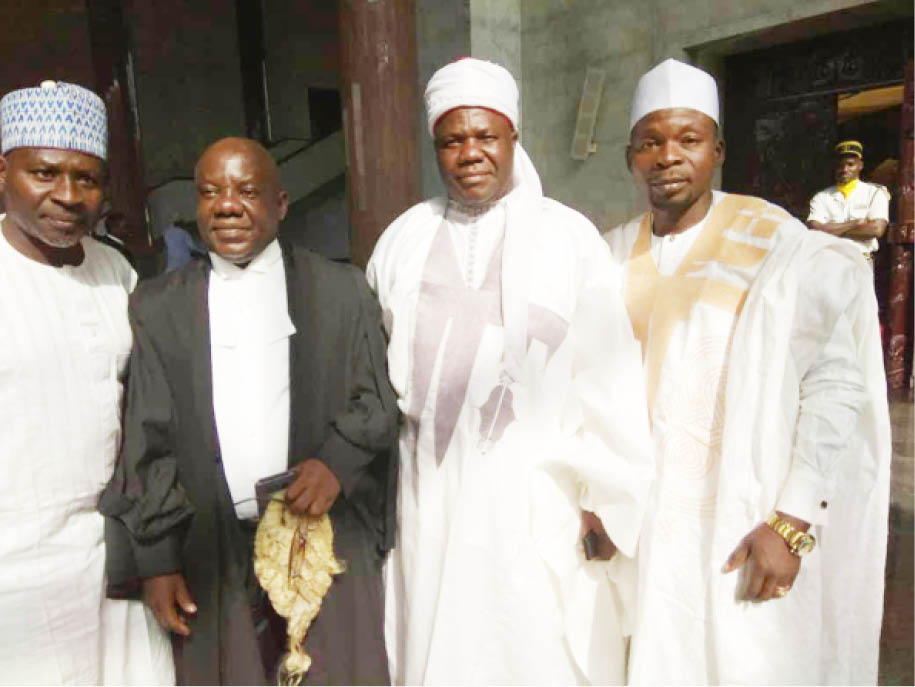How 15-year-old chieftaincy dispute was resolved at Supreme Court
The Supreme Court made a historic judgment on February 1 when it restored Architect Hudu Ibrahim Manomi as the Sum-Pyem-elect of Pyem Chiefdom, Gindiri in Mangu Local Government Area of Plateau State after 15 years of legal battle. The judgement has affirmed the requirement of the law on Section 150 (1) of the Evidence Act […]

Architect Hudu Manomi (2nd right) with his lawyer, John Mathew and members of his chiefdom at the end of the Supreme Court judgement
The Supreme Court made a historic judgment on February 1 when it restored Architect Hudu Ibrahim Manomi as the Sum-Pyem-elect of Pyem Chiefdom, Gindiri in Mangu Local Government Area of Plateau State after 15 years of legal battle.
The judgement has affirmed the requirement of the law on Section 150 (1) of the Evidence Act which holds that there is presumption of regularity in favour of a party where there exists no evidence to rebut the presumption.
The judgement heralds the sanctity of the selection process by the kingmakers to the royal stool including the Legal Notice No 1 of 1992 contained in the Plateau State Gazette dealing with the Appointment and Deposition of Chiefs (Appointment of Sum Pyem) Order 23rd April, 1992 (as amended). It also marks the closure to the dispute and therefore vacancy in the office of the Sum Pyem of Pyem Kingdom in Plateau State.
A concurrent judgement by a five-member panel of justices on Friday upheld the decision of a Plateau State High Court in Jos, which dismissed the suit challenging Manomi’s election to the stool.
In the lead judgement, Justice Mary Odili granted all the prayers of Manomi, including the payment of his outstanding entitlements.
“A free and fair election was conducted with virtually all but one traditional selector and the 1st appellant (Manomi) emerged as the winner of the election out of the two contestants. To my mind, there was substantial compliance with the enabling instrument guiding the selection exercise i.e. Exhibit 9,” the panel held.
“The mere non-issuance of seven days’ notice, allowing the presence of officials not approved by Exhibit 9 and the exclusion of 12th selectors are of no moment and cannot vitiate the election exercise or affect the result of the exercise as held by the lower court. These two issues are therefore resolved against the respondents in favour of the appellants.”
For Manomi, the saying that ‘Justice delayed is justice denied,’ may well mean the harder the fight, the sweeter the victory through the help of the judicial system in the country.
The suit was first filed at the high court in Jos, Plateau State following disagreement on the conduct of the king’s selection exercise of May 17, 2005. The court on April 13, 2006 upheld the conduct of the selection process.
Two members of the royal house, Joseph Mato Dakat and J.C.K. Mallum had challenged the eligibility of Manomi and the selection process.
They had joined 15 other parties as defendants in the suit with number: PLD/J285/04 are: Architect Hudu Ibrahim Manomi and other kingmakers, Yahaya Zailani (Gyarta Chanso); Tanko Sabo (Wucicirin Pyemgiji); Idris Gidado (Pakachin Langai); Garba Buba Mangkam (Madaki Chanso); Alhaji Dauda Adamu (Galadima Chanso); and Nuhu Bako (Madakin Pyemgiji).
Others are: Galadima Isa (Galadiman Pyemgiji); Abdullahi Aibas (Galadiman Gindiri); Alhaji Bala Gaya (Madakin Gindiri); Alhaji Ali Sati (Wucicirin Gindiri); Ali Bature (Galadima Langai): Haruna Bako, Mangu Local Government and Plateau State Government.
Dakut and Mallum had sought among other reliefs, a declaration that Manomi is not a member of the Gadai Ruling House of Pyem chiefdom and therefore not eligible to contest; that they are the only ones that can contest.
But in the judgment, Justice J.H. Sankey held that the plaintiffs failed to prove the claims against Manomi. She therefore dismissed the claims.
Not satisfied, the plaintiffs further appealed to the Court of Appeal in Jos. But the appellate court partially upheld their reliefs, which were finally quashed at the apex court.
Having secured justice through the judicial process, Manomi now seeks executive seal to the verdict in his favour. In a letter to the governor of Plateau State dated 15th February. 2019, through his counsel, Justin Chuwang Esq., he pleads for the governor’s directive implementing the apex court’s decision.
The verdict has increased faith in the country’s judicial process.
